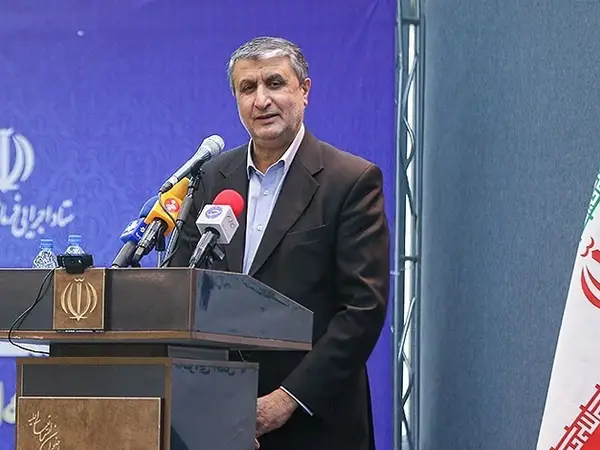Iran’s atomic energy chief said Friday evening that Tehran’s expansion of the nuclear program had made “the enemies decide to go back to their commitments.”
Speaking in Kashan in honor of “nuclear martyrs” – presumably assassinated Iranian scientists – Mohammad Eslami extolled the benefits of nuclear technology in power generation, agriculture and medical treatment. “The enemy has tried to prevent the Islamic Republic from obtaining advanced technology,” he said.
Eslami has been among leading officials, including President Ebrahim Raisi, insisting the International Atomic Energy Agency must end its enquiries into uranium traces found in Iran as a condition for Tehran returning its nuclear program to the limits of the 2015 nuclear deal, the JCPOA (Joint Comprehensive Plan of Action). Tehran began exceeding JCPOA limits 2019, after the United States left the JCPOA in 2018.
Eslami’s latest remarks come as analysts detect signs of Tehran hardening its stance in on-going nuclear talks, despite both and the US reacting positively to an August 15 Iranian response to a European Union draft text circulated August 8 aiming to bridge US-Iran difference.
An official from one of the European JCPOA signatories – France, Germany, and the United Kingdom; the ‘E3’ – told journalist Laura Rozen Friday that Iran’s latest input on the EU draft text, which Tehran sent Thursday, had “moved us very far back – at a time when, thanks to the EU co-ordinator’s perseverance, and everyone’s flexibility, we were almost there.”
The official’s outlook was bleak. “It’s very difficult to know whether this is fixable,” he said. “In any case, Iran has given a clear signal it is not interested in a deal now.”
US spokesman Vendant Patel said late Thursday that Iran’s input was “not constructive,” a statement Iran deemed ‘hasty.’ Adriene Watson, spokesperson for the National Security Council, moderated the US response later, describing negotiations as a “regular back and forth” in which “some gaps have closed in recent weeks but others remain.”
EU ‘at outer limits of flexibility’
The European official speaking to Rosen highlighted Iran’s approach to the IAEA probe where he said the August 8 EU text was “at the outer limits of our flexibility already – and which they implicitly accepted in their August 15 response.” The Wall Street Journal’s Laurence Norman also reported Thursday he had been told by several sources Iran had added the closure of the IAEA probe “back into its formal concerns.”
In an interview with al-Jazeera television late Friday, relayed Saturday by the official news agency IRNA, Mohammad Marandi, who acts as a spokesman for the Iranian negotiating team, stressed the importance of tightening the language in any accord reviving the JCPOA.
Marandi said that “ambiguities or gaps” could be misused by the US to follow the example of President Donald Trump in withdrawing from the JCPOA. He also stressed the importance of resolving, before the 2015 deal was revived, “fake and politicized accusations made by the IAEA against Iran in the Board of Governors.”
‘Necessary political will’
The US and E3 have insisted Iran must satisfy the agency over the uranium traces, regardless of the JCPOA under its commitment as a signatory of the Nuclear Non-Proliferation Treaty. This 35-member IAEA board passed a resolution raised by the US and E3 censuring Iran.
Iran, by contrast, has argued there is a 2015 precedent in the IAEA closing its enquiries into Tehran’s pre-2003 work, only to revive them after allegations made by Israel in 2018. In his Jazeera interview, Marandi highlighted June’s visit of IAEA chief Rafael Mariano Grossi to Israel shortly before the board voted as evidence that “their [the IAEA’s] stance towards Iran has been politicized.”
Despite remaining challenges in the talks, some see agreement looming. Citing Israel’s Channel 12, Iran International Saturday reported an Israeli foreign ministry report expecting this “within weeks.” Mikhail Ulyanov, Russia’s ambassador to the IAEA, tweeted Friday that the “Iranian suggestions aren’t over-ambitious and can be accommodated provided there is the necessary political will.”
